The Michigan Wolverines football team, representing the University of Michigan, is a dominant force in NCAA Division I FBS college football. Holding the record for the most all-time wins in college football history, Michigan is recognized for its iconic winged helmet, spirited fight song, and consistently high attendance at Michigan Stadium. The team maintains intense rivalries, most notably its annual clash with Ohio State known as "The Game", considered one of the greatest rivalries in sports.
1900: Michigan seeks new football coach
After the 1900 season, Charles A. Baird offered Fielding H. Yost a coaching position due to dissatisfaction with recent performance.
1900: Michigan Wolverines coaching history
From 1900 to 1989, Michigan was led by a series of nine head coaches, each of whom has been inducted into the College Football Hall of Fame either as a player or as a coach.
1901: Michigan retroactively awarded national titles
Also during 1926, Michigan was retroactively awarded national titles for the 1901 and 1902 seasons via the Houlgate System.
1901: Michigan participates in the inaugural Rose Bowl
At the end of the 1901 season, Michigan participated in the inaugural Rose Bowl and dominated the game.
1901: Michigan continues undefeated streak
From 1901 through 1904, Michigan didn't lose a single game.
1901: Fielding H. Yost becomes Michigan's head coach
In 1901, Fielding H. Yost became Michigan's head coach and guided his "Point-a-Minute" squads to a streak of 56 games without a defeat.
1902: Michigan retroactively awarded national titles
Also during 1926, Michigan was retroactively awarded national titles for the 1901 and 1902 seasons via the Houlgate System.
1902: Michigan victory in the Rose Bowl
In 1902, Michigan had a victory in the Rose Bowl, the first college football bowl game ever played.
1903: Michigan claims titles
Other major selectors retroactively awarded Michigan with titles in the 1903, 1904, 1918, 1923, 1925, and 1926 seasons.
1904: Michigan continues undefeated streak
From 1901 through 1904, Michigan didn't lose a single game.
1904: Michigan claims titles
Other major selectors retroactively awarded Michigan with titles in the 1903, 1904, 1918, 1923, 1925, and 1926 seasons.
1905: End of Michigan's undefeated streak
In 1905, Fielding H. Yost's "Point-a-Minute" squads' streak of 56 games without a defeat came to an end.
1906: Ferry Field Constructed
In 1906, Ferry Field was constructed with a maximum temporary capacity of 18,000, powered by a $30,000 donation from Dexter M. Ferry.
1906: Michigan ties for Big 9 title
In 1906, Michigan tied for another Big 9 title before opting to go independent for the 1907 season.
1907: Michigan takes a hiatus from the Big Ten Conference
In 1907, Michigan began a hiatus from the Big Ten Conference.
1907: Michigan goes independent
In 1907, Michigan opted to go independent after tying for a Big 9 title in 1906.
1908: Michigan gets battered by Penn
In 1908, Michigan got battered by Penn in a game in which Michigan center Germany Schulz took such a battering as to have to be dragged off the field.
1909: Michigan suffers first loss to Notre Dame
In 1909, Michigan suffered its first loss to Notre Dame, leading Yost to refuse to schedule another game against Notre Dame.
1910: National Champions Selection
Michigan selected as national champions by various NCAA-designated major selectors.
1916: Michigan rejoins the Big Ten Conference
In 1916, Michigan rejoined the Big Ten Conference after a hiatus.
1916: Michigan's struggles continue
Overall from 1907 to 1916, Michigan lost at least one game every year (with the exception of 1910).
1917: Michigan rejoins the Big 9
In 1917, Michigan rejoined the Big 9, after which it was called the Big Ten.
1921: Big Ten Bowl Restriction
From 1921 to 1945, the Big Ten Conference prohibited its teams from participating in bowl games.
1921: Yost as athletic director
In 1926, Yost stepped aside to focus on being Michigan's athletic director, a post he had held since 1921, thus ending the greatest period of success in the history of Michigan football.
1924: George Little coaches the Wolverines
In 1924 the Wolverines were coached by George Little, and saw their 20-game unbeaten streak end at the hands of Red Grange. After the season, Little left Michigan to accept positions at Wisconsin, returning athletic director Yost to the head coaching position.
1925: National Champions Selection
Michigan selected as national champions by various NCAA-designated major selectors.
1925: "Benny-to-Bennie" combination
The 1925 and 1926 seasons did not include a conference title, but they were memorable due to the presence of the famous "Benny-to-Bennie" combination.
1926: Contemporaneous Selectors
Before 1926, there were generally no contemporaneous selectors for championships.
1926: Michigan Most Valuable Player Award Began
Beginning in 1926, Michigan awarded the Michigan Most Valuable Player Award.
1926: Yost steps aside to focus on being Michigan's athletic director
In 1926, Yost stepped aside to focus on being Michigan's athletic director, a post he had held since 1921, thus ending the greatest period of success in the history of Michigan football.
1926: Yost steps aside
In 1926, Yost stepped aside to focus on being Michigan's athletic director, ending his greatest period of success. Also, in 1926, Michigan was retroactively awarded national titles for the 1901 and 1902 seasons via the Houlgate System.
1926: National Champions Selection
Michigan selected as national champions by various NCAA-designated major selectors.
1928: Michigan has a losing record
In 1928, Michigan ended the year with a losing 3–4–1 record and Tad Wieman was fired.
1929: Harry Kipke takes over as head coach
In 1929, Harry Kipke took over as head coach of the Michigan Wolverines.
1930: Kipke returns Michigan to prominence
From 1930 to 1933, Kipke returned Michigan to prominence.
1932: Harry Newman wins awards
In 1932, Harry Newman was a unanimous first-team All-American, and the recipient of multiple awards.
1933: Kipke returns Michigan to prominence
From 1930 to 1933, Kipke returned Michigan to prominence. After 1933, however, Kipke's teams compiled a 12–22 record from 1934 to 1937.
1934: Gerald Ford voted most valuable player
In 1934, Gerald Ford started at center and was voted most valuable player by his teammates.
1934: Michigan concedes to Georgia Tech's racist demands
The 1934 Michigan team only won one game, against Georgia Tech in a controversial contest where Michigan conceded to Georgia Tech coach W. A. "Bill" Alexander's racist demands to keep Willis Ward off the field.
1936: Inception of the AP poll
Since the Associated Press (AP) poll's inception in 1936, Michigan has finished in the top ten a total of 39 times.
1937: Kipke's teams struggle
From 1934 to 1937, Kipke's teams compiled a 12–22 record.
1938: Start of successful seasons under Crisler
Beginning in 1938, Crisler led Michigan to a period of success, marked by one and two-loss seasons. This period from 1938 to 1944 resulted in a 48–11–2 record.
1938: Fritz Crisler becomes Michigan's head coach
In 1938, Fritz Crisler brought his winged helmet from Princeton University and became Michigan's head coach.
1938: Winged helmet debut
In 1938, Michigan debuted the winged helmet in a game against Michigan State. The helmet was introduced by Crisler, ostensibly to help his players find receivers downfield.
1938: Michigan hires Fritz Crisler
In 1938, Michigan hired Fritz Crisler as Kipke's successor, granting him the position of athletic director and the highest salary in college football.
1938: Consecutive NFL Drafts
Starting in 1938, Michigan had at least one player selected in any round in an NCAA record 87 consecutive NFL drafts.
1940: Tom Harmon wins Heisman Trophy
In 1940, Tom Harmon led the Wolverines to a 7–1 record and won the Heisman Trophy. Harmon ended the season by scoring three rushing touchdowns, two passing touchdowns, four extra points, intercepting three passes, and punting three times for an average of 50 yards in a game against the Ohio State Buckeyes.
1941: NCAA rule allowed players to enter or leave at any point during the game
In 1941, an NCAA rule change allowed players to enter or leave a game at any point. This rule was later taken advantage of by Crisler in 1945.
1942: Michigan plays Notre Dame again
In 1909, Michigan suffered its first loss to Notre Dame, leading Yost to refuse to schedule another game against Notre Dame; the schools did not play again until 1942.
1943: No. 1 (Notre Dame) vs. No. 2 (Michigan) match-up
In 1943, the No. 1 Notre Dame team faced off against No. 2 Michigan, a game the Wolverines lost 35–12. Michigan ended the season at 8–1, winning Crisler's first Big Ten championship.
1944: Successful Seasons Under Crisler
From 1938 to 1944, Michigan had a 48-11-2 record under Crisler.
1945: Big Ten Bowl Restriction
From 1921 to 1945, the Big Ten Conference prohibited its teams from participating in bowl games.
1945: Crisler uses two-platoon football
In 1945, Crisler utilized a 1941 NCAA rule to introduce "two-platoon football" during a game against Army, dividing his team into offensive and defensive specialists. Although Michigan lost the game 28–7, this strategy shaped the future of the game.
1946: Big Ten Bowl Restriction Change
From 1946 to 1974, only the conference champion or a surrogate representative could attend a bowl game, the Rose Bowl, with restrictions on consecutive appearances.
1947: Michigan wins conference and national title
In 1947, Crisler's team, nicknamed the "Mad Magicians" because of their use of two-platoon football, won a conference championship and a national title.
1947: Michigan wins national title and Rose Bowl
In 1947, Fritz Crisler led the Wolverines to a national title and Michigan's second Rose Bowl win.
1947: Finished consecutive seasons ranked in the top three
In 2022, This marked the first time since 1947 and 1948 that Michigan finished consecutive seasons ranked in the top three.
1948: Bennie Oosterbaan First Year
In 1948 Bennie Oosterbaan defeated Michigan State in his first year as Head Coach of the Michigan Wolverines.
1948: Michigan claims a national championship
In 1948, Michigan claimed one of its twelve national championships from the major wire-service: the AP Trophy and/or Coaches' Trophy.
1948: Michigan wins undisputed national championship
In 1948, the 2023 Michigan Wolverines won the program's first undisputed national championship since 1948.
1948: Finished consecutive seasons ranked in the top three
In 2022, This marked the first time since 1947 and 1948 that Michigan finished consecutive seasons ranked in the top three.
1948: Michigan wins 1948 Rose Bowl
The 1947 team, nicknamed the "Mad Magicians", capped their season with a 49-0 victory over the USC Trojans in the 1948 Rose Bowl.
1951: Decline of Michigan's football team
From 1951 to 1958, Michigan compiled a record of 42–26–2 under Oosterbaan, a decline from previous success.
1951: Oosterbaan selected for All-Time All-American team
In 1951, Bennie Oosterbaan was selected for the All-Time All-American team.
1953: Michigan State Joins Big Ten, Paul Bunyan Trophy Created
Since Michigan State joined the Big Ten Conference in 1953, the two schools have competed annually for the Paul Bunyan Trophy.
1955: Michigan Stadium Expansion
In 1955, Michigan Stadium cracked the 100,000 mark by expanding to 101,001.
1958: Oosterbaan steps down
Under mounting pressure, Oosterbaan stepped down as football coach after the 1958 season.
1959: Michigan Most Valuable Player Award End
Ending in 1959, Michigan awarded the Michigan Most Valuable Player Award.
1959: Bump Elliott becomes head coach
In 1959, Bump Elliott, a former Michigan player, took over as head coach.
1960: Louis B. Hyde Memorial Award Began
Beginning in 1960, Michigan awarded the Louis B. Hyde Memorial Award.
1961: Big Ten Bowl Exception
In 1961, Minnesota had an exception made to the rule preventing teams from going to a bowl game two years in a row.
1962: Big Ten Bowl Exception
In 1962, Minnesota had an exception made to the rule preventing teams from going to a bowl game two years in a row.
1964: National Champions Selection
Michigan selected as national champions by various NCAA-designated major selectors.
1967: First losing campaign since 1967
In 2008, Michigan finished at 3–9, suffering its first losing campaign since 1967, and missed a bowl game invitation for the first time since 1974.
1968: Elliott resigns after loss to Ohio State
Following a 50-14 loss to Ohio State in 1968, Bump Elliott resigned as head coach.
1969: Bo Schembechler coaches Michigan
In 1969, Bo Schembechler began his tenure coaching the team for 21 seasons.
1969: Michigan upsets Ohio State, launching The Ten Year War
In 1969, Michigan, coached by Bo Schembechler, upset the Ohio State Buckeyes, launching The Ten Year War between Hayes and Schembechler. Michigan won 24-12 and went to the Rose Bowl.
1970: Michigan loses to Ohio State
In 1970, Schembechler failed to repeat the success of 1969, losing to Ohio State 20–9 and finishing at 9–1.
1971: Michigan loses to Stanford in the Rose Bowl
In 1971, Schembechler led Michigan to an undefeated regular season, only to lose to the Stanford Indians in the Rose Bowl, finishing at 11–1.
1972: Big Ten Bowl Exception
In the 1972 Rose Bowl, an exception was made to the rule preventing teams from going to a bowl game two years in a row.
1973: National Champions Selection
Michigan selected as national champions by various NCAA-designated major selectors.
1974: Big Ten Bowl Restriction Change
From 1946 to 1974, only the conference champion or a surrogate representative could attend a bowl game, the Rose Bowl, with restrictions on consecutive appearances.
1974: Missed a bowl game invitation for the first time since 1974.
In 2008, Michigan finished at 3–9, suffering its first losing campaign since 1967, and missed a bowl game invitation for the first time since 1974.
1975: Start of attendance record
During the 1975 season, the first of Michigan's record streak of games with more than 100,000 people in attendance occurred during a game against the Purdue Boilermakers.
1975: Missed a bowl game
In 2014, This marked only the third season since 1975 in which Michigan missed a bowl game.
1976: National Champions Selection
Michigan selected as national champions by various NCAA-designated major selectors.
1978: Winning Back-to-Back games as underdogs
In 1978, Michigan became the first team since 1978 to win back-to-back games as double digit underdogs
1979: Memorable game against Indiana
The 1979 season included a memorable game against Indiana that ended with a touchdown pass from John Wangler to Anthony Carter with six seconds left in the game. Michigan went 8–4 on the season, losing to North Carolina in the 1979 Gator Bowl.
1980: Michigan wins in the Rose Bowl under Schembechler
In 1980, Michigan went 10–2 and got their first win in the Rose Bowl under Schembechler, a 23–6 win over Washington.
1981: Michigan under Schembechler
From 1981 through 1989, Michigan went 80–27–2, winning four Big Ten titles and going to a bowl game every year.
1981: Schembechler's second bowl win
In 1981, Michigan went 9–3 and got Schembechler's second bowl win in the 1981 Bluebonnet Bowl.
1982: Jim Harbaugh plays for Michigan
From 1982 to 1986, Jim Harbaugh played for Michigan under Schembechler.
1982: Michigan wins the Big Ten championship
In 1982, Michigan won the Big Ten championship while being led by three-time All-American wide receiver Anthony Carter.
1983: Michigan fell to UCLA Bruins in the 1983 Rose Bowl
In 1983, Michigan fell to UCLA Bruins in the 1983 Rose Bowl, and did not win the Big Ten title.
1984: Worst season under Schembechler
In 1984, the Wolverines suffered their worst season under Schembechler, going 6–6 with a loss to national champion BYU in the 1984 Holiday Bowl.
1985: Harbaugh leads Michigan to successful season
In 1985, Jim Harbaugh led the Wolverines to a 5–0 record and a No. 2 ranking, finishing the season at 10–1–1 with a victory over Nebraska in the 1986 Fiesta Bowl.
1985: National Champions Selection
Michigan selected as national champions by various NCAA-designated major selectors.
1986: Jim Harbaugh plays for Michigan
From 1982 to 1986, Jim Harbaugh played for Michigan under Schembechler.
1987: Michigan has difficult season after Harbaugh's departure
In 1987, after the departure of Harbaugh, Michigan had a difficult season, finishing with an 8–4 record.
1988: Michigan wins Big Ten title
In 1988, Michigan bounced back, winning the Big Ten title outright at 9–2–1 and securing a trip to the Rose Bowl.
1989: Michigan Wolverines coaching history
From 1900 to 1989, Michigan was led by a series of nine head coaches, each of whom has been inducted into the College Football Hall of Fame either as a player or as a coach. Also, in 1989 Bo Schembechler ended his 21 season tenure as head coach.
1989: Michigan wins Big Ten title
In 1989, Michigan won the Big Ten title outright at 10–2 and secured a trip to the Rose Bowl.
1991: Desmond Howard wins Heisman Trophy
In 1991, Desmond Howard had a memorable season that led him to win the Heisman Trophy.
1992: Michigan wins Rose Bowl
The 1992 team, led by quarterback Elvis Grbac, posted a 9–0–3 record, defeating Washington in the 1993 Rose Bowl.
1993: Michigan-Penn State Series Begins
In 1993, Michigan and Penn State began playing each other when Penn State joined the Big Ten.
1994: Louis B. Hyde Memorial Award End
Ending in 1994, Michigan awarded the Louis B. Hyde Memorial Award.
1995: Hoke Served as an assistant
Brady Hoke had previously been an assistant at Michigan under Lloyd Carr from 1995 to 2002.
1995: Carr named head coach
Lloyd Carr was appointed interim head coach for the 1995 season and then named head coach after an 8-2 start. Michigan finished the season at 9-4.
1997: Charles Woodson wins the Heisman Trophy
In 1997, Charles Woodson won the Heisman Trophy.
1997: Carr wins a national championship
In 1997, Lloyd Carr won a national championship.
1998: Woodson wins Heisman Trophy
In 1998, Charles Woodson won the Heisman Trophy and was selected 4th overall in the 1998 NFL draft by the Oakland Raiders.
1998: Michigan Stadium Regained Title
In 1998, Michigan Stadium recaptured the title of "largest stadium" with an expansion to 107,501.
2000: Michigan ties for Big Ten championship
In 2000, Drew Henson led Michigan to a 9–3 record and a tie for the Big Ten championship. Ohio State fired their coach John Cooper and replaced him with Jim Tressel.
2001: Tressel upsets Michigan
In 2001, Jim Tressel upset the Wolverines 26–20. Michigan State defeated Michigan with a pass in the last second of the game in a controversial finish that led to the game being referred to as "Clockgate."
2002: Hoke Served as an assistant
Brady Hoke had previously been an assistant at Michigan under Lloyd Carr from 1995 to 2002.
2003: Michigan wins Big Ten championship
In 2003, John Navarre and Doak Walker Award winner Chris Perry led the Wolverines to a 10–3 record, a Big Ten championship, and an appearance in the 2004 Rose Bowl.
2003: First Big Ten Championship since 2003
In 2021, The No. 2 ranked Wolverines dominated the Hawkeyes 42–3 to win their first outright Big Ten Championship since 2003.
2006: Beat Notre Dame, lost to Ohio State
In 2006, Michigan had an 11-0 start, propelled by a 47-21 win over Notre Dame. On the day before the Ohio State game, Bo Schembechler died. Michigan lost to Ohio State 42-39, then lost to USC in the 2007 Rose Bowl.
2007: Lost to Appalachian State and Ohio State, Lloyd Carr announced retirement
In 2007, Michigan lost to Appalachian State and Oregon early in the season, but won their next eight games. Michigan lost to Ohio State 14-3. After the game, Lloyd Carr announced that he would retire as Michigan head coach after the bowl game.
2007: Michigan Stadium Renovation Authorized
In 2007, the Board of Regents authorized a $226 million renovation to add a new press box, 83 luxury boxes, and 3,200 club seats to Michigan Stadium.
2007: First bowl win since the season of 2007
In his first season, Hoke led the Wolverines to 11 wins, beating rival Notre Dame. This was the program's first bowl win since the season of 2007.
2007: Lost to USC in the Rose Bowl
Michigan lost to USC in the 2007 Rose Bowl, ending the season at 11–2.
2008: Finished season at 3-9
In 2008, Michigan finished at 3–9, suffering its first losing campaign since 1967, and missed a bowl game invitation for the first time since 1974.
2008: Bowl Game Miss
In 2008, Michigan missed a bowl game, ending a 33-year streak of consecutive bowl game appearances.
2008: Defeated Florida in Capital One Bowl
In the 2008 Capital One Bowl, Lloyd Carr's final game, Michigan defeated the defending national champion Florida Gators, led by Heisman Trophy winner Tim Tebow, 41–35.
January 11, 2011: Hiring of Brady Hoke
On January 11, 2011, Michigan announced the hiring of Brady Hoke as the new head coach.
2011: Lights Installed at Michigan Stadium
For the 2011 season, lights were installed at Michigan Stadium at the cost of $1.8 million, allowing Michigan to play its first night game at home against Notre Dame in 2011.
December 2, 2014: Firing of Brady Hoke
On December 2, 2014, Brady Hoke was fired as the head coach after four seasons following a 5–7 record in 2014.
December 30, 2014: Michigan hires Jim Harbaugh
On December 30, 2014, Michigan hired Jim Harbaugh as head coach.
2014: Regents Field Funding Adjusted for Inflation
In 1890, the Board of Regents authorized $3,000 for the purchase of land. In 1891 a further $4,500 was authorized for the athletic field. The $3,000 converts to $78,947.37 in 2014 dollars, and the $4,500 converts to $118,421.05 in 2014 dollars.
July 2015: Michigan Football Legends Program Discontinued
In July 2015, the Legends program was discontinued, and the numbers again permanently retired.
2015: Michigan Possesses Little Brown Jug
As of 2015, Michigan has possessed the Little Brown Jug trophy.
2015: Hiring of Jim Harbaugh
On December 30, 2014, the University of Michigan announced the hiring of Jim Harbaugh as the team's 20th head coach. In his first season in 2015, Harbaugh led Michigan to a 10–3 record.
2016: Lost to Florida State in the Orange Bowl
In 2016, the Wolverines won their first nine games, but lost to Iowa and Ohio State, and ended the season with a 33–32 loss to Florida State in the Orange Bowl on December 30. Jabrill Peppers finished fifth for the Heisman Trophy.
2016: Won against Florida Gators in the Citrus Bowl
In his first season in 2015, Harbaugh led Michigan to a 10–3 record, including a 41–7 win over the Florida Gators in the 2016 Citrus Bowl.
2017: Finished the regular season with 8-4 record
In 2017, the Wolverines went 8–4 in the regular season losing to their main rivals, Michigan State and Ohio State. They also lost to South Carolina in the Outback Bowl, finishing the year 8–5.
2018: Finished the regular season with 8-4 record
In 2017, the Wolverines went 8–4 in the regular season losing to their main rivals, Michigan State and Ohio State. They also lost to South Carolina in the Outback Bowl, finishing the year 8–5.
2018: Lost to Florida in Peach Bowl
In 2018, Michigan started with a loss to Notre Dame, followed by ten consecutive wins. The Wolverines rose to No. 4 in the College Football Playoff rankings, but were upset by rival Ohio State by a score of 62–39 to end the regular season. A blowout loss to Florida in the Peach Bowl ended the season, finishing at 10–3.
2018: Sherrone Moore joins Harbaugh's coaching staff
Since 2018, Sherrone Moore had been on Jim Harbaugh's coaching staff.
2019: Michigan Defeats Notre Dame
In 2019, Michigan defeated Notre Dame 45-14. Michigan leads the overall series 25-17-1.
2020: Winless at home
For the 2020 season, COVID-19 precautions delayed the start of Big Ten play. Michigan was winless at home during the 2020 season, marking the first time in program history that they did not win any games at home.
January 8, 2021: Harbaugh contract extension
On January 8, 2021, the Michigan administration and Jim Harbaugh agreed to a contract extension with a pay-cut through 2025.
2021: Harbaugh leads Wolverines to Big Ten titles and Playoff appearances
From 2021 to 2023, Jim Harbaugh led the Wolverines to three consecutive Big Ten titles and College Football Playoff appearances.
2021: George Jewett Trophy Created
In 2021, Michigan and Northwestern announced the creation of the George Jewett Trophy, awarded to the game's winner.
2021: Won Big Ten Championship
In 2021, Michigan beat Ohio State 42–27, giving the Wolverines their first win against the Buckeyes since 2011, and a berth into their first-ever Big Ten Championship Game. The No. 2 ranked Wolverines dominated the Hawkeyes 42–3 to win their first outright Big Ten Championship since 2003.
2022: Wolverines Possess Paul Bunyan Trophy
As of 2022, the Wolverines have possessed the Paul Bunyan Trophy
2022: Second Straight Big Ten East Division Championship
In 2022, Michigan began the season ranked No. 8. Michigan's perfect 12–0 regular season record earned them their second straight Big Ten East Division championship and an appearance in the Big Ten Championship Game. Michigan would defeat the West Division champions Purdue 43–22, and repeat as conference champions and earn a second consecutive College Football Playoff appearance.
2023: Harbaugh leads Wolverines to Big Ten titles and Playoff appearances
From 2021 to 2023, Jim Harbaugh led the Wolverines to three consecutive Big Ten titles and College Football Playoff appearances. Also, in 2023 the Michigan Wolverines won the program's first national championship since 1997.
2023: Michigan claims a national championship
In 2023, Michigan claimed one of its twelve national championships from the major wire-service: the AP Trophy and/or Coaches' Trophy.
2023: Michigan Defeats Penn State
In 2023, Michigan defeated Penn State 24-15 in Beaver Stadium under then-acting head coach Sherrone Moore, propelling the Wolverines to a national championship that season.
2023: Harbaugh Suspended, Sign-Stealing Allegations, Championship Win
In 2023, the season began with Harbaugh's three-game suspension for recruiting violations. The NCAA investigated Michigan for sign-stealing allegations. Linebackers coach Chris Partridge was fired, and Harbaugh was suspended for the final three regular-season games. Sherrone Moore became acting head coach, leading the team to victories. After his suspension, Harbaugh coached Michigan to a Big Ten Championship win against Iowa and secured a playoff berth. Michigan defeated Alabama in the Rose Bowl and Washington in the College Football Playoff National Championship, setting a program record with 15 wins.
2023: Michigan Stadium Renovation
Michigan Stadium underwent a renovation for the 2023–2024 season, installing new screens and LED stadium lighting with color-changing fixtures.
January 26, 2024: Moore promoted to head coach
On January 26, 2024, Sherrone Moore was promoted to head coach, two days after Harbaugh's departure.
May 15, 2024: Schedules Announced
Announced schedules as of May 15, 2024.
2024: Michigan Inductees in College Football Hall of Fame
As of 2024, Michigan has inductees into the College Football Hall of Fame.
2024: Sherrone Moore's First Season
In 2024, Sherrone Moore led the Michigan Wolverines to an 8-5 record, including wins over Michigan State, Ohio State, and Alabama. In the regular season finale against the No. 2 ranked Buckeyes, Moore led Michigan to a 13–10 upset victory at Ohio Stadium, despite entering as 20.5 point underdogs, marking the fourth consecutive victory for Michigan. On December 31, 2024, Moore won his first postseason game in the ReliaQuest Bowl against No. 11 Alabama. Michigan became the only program in college football history to beat Alabama twice in the same calendar year.
2024: Big Ten Divisions Dissolved
In 2024, the Big Ten east division was dissolved.
2024: Michigan Stadium Renovation
Michigan Stadium underwent a renovation for the 2023–2024 season, installing new screens and LED stadium lighting with color-changing fixtures.
October 2025: Information Updated
Information about Michigan Wolverines football was updated as of October 2025.
2025: Wolverines Retain Paul Bunyan Trophy
In 2025, Michigan retained the Paul Bunyan Trophy with a 31–20 win over the Spartans.
2025: Harbaugh contract extension
On January 8, 2021, the Michigan administration and Jim Harbaugh agreed to a contract extension with a pay-cut through 2025.
Mentioned in this timeline

Tom Brady is a retired American football quarterback renowned as...
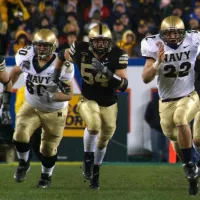
College football is a popular amateur sport in the United...
World War II - was a global conflict between the...
Arizona is a landlocked state in the Southwestern U S...

Football is a family of team sports primarily involving kicking...
Virginia a state in the Southeastern and Mid-Atlantic US lies...
Trending
56 minutes ago ASU defeats Utah, court rejects Trump tariff refund slowdown attempt.
57 minutes ago The Office stars reunited at the 2026 Actor Awards in Los Angeles.
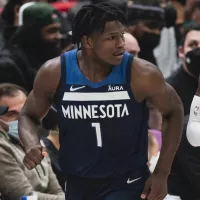
57 minutes ago Anthony Edwards Shines as Timberwolves Defeat Grizzlies; Named NBA Player of Week
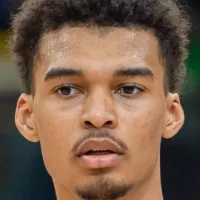
57 minutes ago Wembanyama's plea aids in finding missing Elijah Hoard at O'Hare airport.
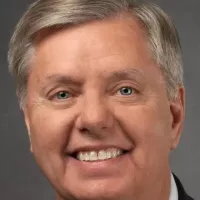
58 minutes ago Lindsey Graham Predicts Cuba Next After Iran Strikes, Regime Collapse Imminent
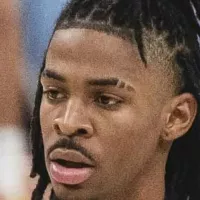
58 minutes ago Ja Morant's potential return this season as he continues to battle injuries.
Popular

Hillary Diane Rodham Clinton is a prominent American politician lawyer...

Jesse Jackson is an American civil rights activist politician and...

Ken Paxton is an American politician and lawyer serving as...

Jim Carrey is a Canadian-American actor and comedian celebrated for...

Bill Clinton served as the nd U S President from...

XXXTentacion born Jahseh Dwayne Ricardo Onfroy was a controversial yet...